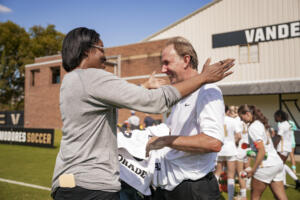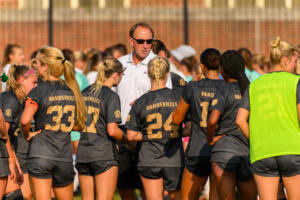More than a Number
by Graham HaysFrom SEC championships to lives changed, 100 Vanderbilt wins is a meaningful milestone for soccer head coach Darren Ambrose
NASHVILLE, Tenn. — With a 4-1 win against Saint Mary’s, Darren Ambrose became just the second coach in Vanderbilt women’s soccer history to amass 100 wins with the Commodores.
He’s transformed the program into an SEC champion, an NCAA Tournament regular and a developmental pipeline to the NWSL. More than merely statistical confirmation of that success, a round number that catches the eye, the wins help tell its story. They reveal not just a motivator and tactician but a teacher at home in his classroom. They are a measure of how a coach, a team and a sport can make a difference in lives.
“I just loved team sports,” Ambrose said. “I learned that I love being around people who are willing to challenge themselves. It wasn’t just about personal challenge or the competitive aspect—which I love—but it was being around other people and contributing in a way that is to the greater good. That is something I like being a part of.”

Candice Storey Lee, vice chancellor for athletics and university affairs and athletic director, congratulates Ambrose after win No. 100 (Truman McDaniel/Vanderbilt Athletics).
Win No. 1: 3-2 at Gonzaga (Aug. 28, 2015)
Ambrose didn’t set out to leave Penn, where he was head coach for 15 seasons. He’d built the program into an Ivy League powerhouse. He and his family were happy in Philadelphia. Schools came calling, but he always politely declined. Vanderbilt was different. Vanderbilt required no compromises; it was another world-class academic institution in a vibrant city. And it offered a tempting opportunity—the biggest of blank canvases. An SEC women’s soccer pioneer that needed a refresh, Vanderbilt could climb as high as he dared imagine.
He was hired in early 2015 to revitalize a program that had won just seven SEC games in the preceding four seasons.
Midway through her first year at Vanderbilt when Ambrose was hired, Tina De Zeeuw was cautiously optimistic about the change. She just hoped there was still a place for her.
De Zeeuw was a well-regarded recruit who’d chosen Vanderbilt ahead of perennial national contenders. That left her all the more disappointed when the team culture her first season felt insufficient for competing for championships. But as is not unheard of for first-year students adjusting to a new world, she also ran afoul of team rules shortly before Ambrose arrived. It’s why her first conversation with the new coach happened sitting across from him in his office. It wasn’t exactly a pleasant chat, even though he tried to soften the subject matter by noting that they might one day be able to look back on it and laugh.
“I felt like I lost myself a little bit my first year due to the environment,” De Zeeuw recalled. “He just grounded me, brought me back down to earth. And in that moment I knew I wanted to turn things around. I wanted to be the person that people look to, the person that people trust and rely on. From that moment on, that’s what I set out to do.”
Cultivating those conditions for success, more than tactics or technical skills, was the first priority in the months leading up to Vanderbilt’s first game under Ambrose. The team went through military-style physical conditioning designed to build fitness and discipline. At the coach’s instigation, they discussed what core values they wanted to hold themselves to. He asked them to commit to working harder than ever before, but he also stressed that soccer was no more important than health, family or school.
“He was tough, but he was still kind,” De Zeeuw said.
Two-sport standout Simone Charley was busy pursuing track and field excellence that spring, but her roommate and soccer teammate chronicled practices that sometimes involved as much running as anything the track team was doing.
“What I really appreciated is he’s hard on you, but it’s because he wants what is best for you,” recalled Charley, a two-time All-SEC soccer honoree who continues to play in the NWSL. “He’s all about building relationships and trust with players individually, so he can hold you accountable and bring out the best in you.”
None of that led to miracles as the 2015 season began. In Ambrose’s first official game, Vanderbilt lost 1-0 to Miami (Ohio). Two days later, they lost at Cincinnati by the same margin. It was disheartening for players who had endured a challenging spring and preseason: They were trying, but a new system and roles weren’t producing new results.
The Commodores traveled to the Pacific Northwest the second week, beginning their stay with a game at Gonzaga. Finally seeing some reward, they took an early 2-0 lead—De Zeeuw scoring her first career goal in the process. But after cutting the deficit in half after the break, Gonzaga scored the tying goal with just 16 seconds left in regulation.
A little more than three minutes into an overtime that could have been psychologically crushing, Charley scored the winner on Vanderbilt’s first shot of the extra period.
It’s perhaps telling that De Zeeuw recalls Ambrose’s less-than-happy team talk after the subsequent loss at Seattle more clearly than anything he said after the landmark win. There was still a great deal of work to do. But in a season that would conclude with Vanderbilt qualifying for the SEC Tournament for the first time in five years, that first victory offered green shoots that sprang from a long spring and summer of cultivating culture.
View this post on Instagram
Win No. 31: 2-1 vs. Ohio State (Nov. 10, 2017)
Anyone who still recalls from long-ago travels the early-morning scent of a bakery or the pealing of church bells knows that small details often linger longest in memory. For Nia Dorsey, what comes immediately to mind from Vanderbilt’s first NCAA Tournament win this century isn’t the historical significance of the moment but the sensation of shivering.
“I remember it being probably one of the coldest games I ever played in,” Dorsey said, laughing.
With good reason. The gametime temperature was 28 degrees that November evening in Columbus. But Dorsey, a sophomore starter, also remembers dancing with teammates in the trailer that served as the visiting team’s pregame space that day. The players always danced before games—every game during her four years at Vanderbilt—singing along at a volume that almost overpowered whatever music source they had. In Columbus, as he always did, Ambrose retreated with an amused shake of the head before returning with his final instructions in the minutes before the team took the field.
That 2017 team’s getting to the NCAA Tournament for the first time in 11 years didn’t happen on vibes alone. But they also weren’t yet the well-oiled machine that would rank among NCAA defensive leaders in subsequent seasons. The mix of holdovers from before Ambrose arrived and his first recruits forged a culture of collaboration.
“I think there was better team chemistry, which led to better results,” recalled De Zeeuw, who was by then a senior who anchored the back line. “That was something that Darren and the coaching staff felt very strongly about. He was always telling us, ‘If you guys can’t trust each other and be a team off the field, then how do you expect that to transition to on the field?’ So, we spent many, many hours doing building exercises, team bonding, which contributed to our success on the field. And the winning, of course, made it more fun.”
Some of the work was lighthearted; players were tasked with working together to build a bridge out of Legos or solve puzzles to get out of an escape room. Some of it tested their resolve—hard training that encouraged them to lean on each other. They rode those strengths to a 13-7-2 record, including the first winning SEC record in more than a decade.
“We knew that we had potential and the program was getting a little bit better,” Dorsey said. “But I don’t think any of us, as underclassmen at least, had the anticipation that it could be the first year we go to the NCAA Tournament in decades. I feel like that really just happened over the course of the season.”
The Commodores weren’t favorites in the first round; they were scheduled on the road to face an Ohio State team that was ranked in the top 20. Sure enough, the visitors didn’t register a shot in the first half and trailed 1-0 at the break. Yet despite the deficit and lack of shots, Dorsey recalled an upbeat mood during halftime. Ambrose had played up the underdog angle beforehand. Now, he looked around and told players there was no reason they couldn’t win the game. They belonged on the field. Dorsey’s goal tied the game with about 30 minutes to play. And with a little more than 60 seconds remaining until overtime, Stephanie Amack headed a corner kick home to secure a 2-1 win—Vanderbilt’s first tournament victory since 1998.

Win No. 46: 4-1 vs. Kentucky (Oct. 21, 2018)
Reading assignments have been almost as plentiful as wins during Ambrose’s time at Vanderbilt. From inspirational memoirs to guides to leadership and more, books are as much a part of training as the dreaded conditioning beep test. Dorsey recalled reading Legacy: What the All Blacks Can Teach Us About the Business of Life, which examines the enduring success of New Zealand’s national rugby team, known as the “All Blacks.”
Ambrose was fond of the metaphorical value of mountains and pyramids even before his time in Nashville—using them to depict different stages of a season or the building blocks for a successful culture. To that end, after the team’s 2017 NCAA run that surprised even some of those involved, Dorsey recalled greater and greater emphasis on the responsibility to build on the foundation already in place. They needed to keep ascending.
“More and more, he talked about the legacy that you’re leaving for the program in general,” Dorsey said. “Are people in five years going to remember this team? Are they going to know the things that you stood for and the values that you held?
“From that culture standpoint, I feel like that started to become more and more important because we were thinking not just about one season, but about a program overall. That was really cool because up until that point, honestly, I hadn’t thought that important thing.”
In 2018, the Commodores allowed the second-fewest goals in program history and ranked 25th in NCAA Division I in goals against average. After losing by a goal against powerhouse Florida State to open the season, they ran up 13 consecutive wins—capped by a 3-1 win at rival Tennessee. In all, they put together a 16-game unbeaten streak that culminated in the 4-1 rout of Kentucky that clinched the SEC regular season title. It was Vanderbilt’s first SEC championship since winning the first two titles that the conference sponsored in 1993–94.

Rings given to members of the 2018 championship team.
Dorsey was a junior in high school when Ambrose took over. She had already committed to Vanderbilt and wasn’t sure what to think. Would the new coach still honor the offer? Their paths hadn’t crossed on the recruiting trail. But in their first conversation, he not only assured her that she still had a home at Vanderbilt but talked about her game with a familiarity that made it all the more genuine when he told her she was wanted. That bond mattered when, in the years to come, he challenged her to be more vocal or needled her about expecting her to put up the best results in conditioning tests. She felt valued, that she had a stake in the program. Which made the 2018 SEC title more than just a trophy.
“I remember, even in that moment, just thinking, ‘This is really cool that I am here. I played a part in this and get to experience the program doing something for the first time in a very long time,’” Dorsey recalled. “I think all of the girls, we were all just so proud of ourselves. It did not happen overnight. Sometimes when things don’t happen overnight, you lose sight of all that it took to get there.”
The Meaning of Winning
Nearly five years removed from wearing a Vanderbilt uniform, Dorsey still gets her competitive fix on soccer fields in and around where she lives in Jersey City, New Jersey. When an app steers her to a new pickup game, she uses the skills honed in twice earning All-SEC honors. She also uses lessons learned on SEC fields in her job with a health care research company.
When she was a freshman, Dorsey never imagined herself becoming a team captain. Yet as she progressed, Ambrose called on her to join the team’s leadership council. He encouraged her to share her perspective with teammates through the everyday ups and downs that are a part of any season and any college career. He told her that people listened when she spoke, that she had a voice and ought to use it.
“That was definitely a very empowering thing that I carry in my life after playing soccer,” Dorsey said.

In 2023, Ambrose and the soccer team traveled to South Africa. There they helped stage a soccer clinic with Hout Bay United FC, a non-profit dedicated to enriching the community through sport (Laura Topp/Vanderbilt Athletics).
Four years into her professional life, the same way she was four years into her college life when she was named captain, she finds history repeating itself. Her managers now trust her to do what she knows how to do—and to bring along younger colleagues.
“We all knew it wasn’t just related to soccer,” De Zeeuw said. “It was always bigger than that and tools for success that you should implement in your everyday life.
“The idea of core values is something he lives by and feels passionately about, so it’s absorbed by the team—we see there is actual benefit in operating like this. I literally still think about it all the time. Many of the values that our team set, I actively think about on a weekly basis. That’s a unique thing for a college coach to instill because they don’t necessarily have to teach you things outside of your sport. But he helped us develop not only as soccer players, but as people and professionals.”
After earning All-SEC honors, De Zeeuw pursued professional soccer opportunities before deciding she was ready to step away from the game. She returned to Vanderbilt and earned a master’s in marketing from the Owen Graduate School of Management. She now works for sports marketing firm Overtime, and she recently got engaged.
To this day, she stops by her old coach’s office whenever she’s in Nashville. If she had reason to fear for her soccer future the first time they sat down to chat all those years ago, the conversations these days are mostly about how bright her future looks.
“He truly changed my life,” De Zeeuw said. “And I attribute a lot of my success and who I am today to him.”
What does a number like 100 really mean? Quite a lot, it turns out.
